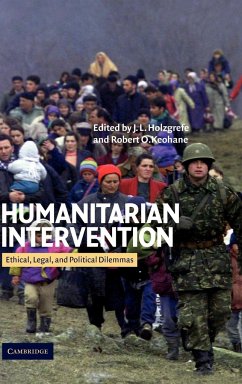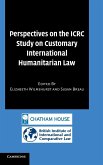An interdisciplinary approach to humanitarian intervention by experts in law, politics, and ethics.
'The genocide in Rwanda showed us how terrible the consequences of inaction can be in the face of mass murder. But the conflict in Kosovo raised equally important questions about the consequences of action without international consensus and clear legal authority. On the one hand, is it legitimate for a regional organization to use force without a UN mandate? On the other, is it permissible to let gross and systematic violations of human rights, with grave humanitarian consequences, continue unchecked?' (United Nations Secretary-General Kofi Annan). This book is a comprehensive, integrated discussion of 'the dilemma' of humanitarian intervention. Written by leading analysts of international politics, ethics, and law, it seeks, among other things, to identify strategies that may, if not resolve, at least reduce the current tension between human rights and state sovereignty. This volume is an invaluable contribution to the debate on all aspects of this vital global issue.
Table of content:
Introduction Robert O. Keohane; Part I. The Context for Humanitarian Intervention: 1. The humanitarian intervention debate J. L. Holzgrefe; 2. Humanitarian intervention before and after 9/11: legality and legitimacy Tom J. Farer; Part II. The Ethics of Humanitarian Intervention: 3. The liberal case for humanitarian intervention Fernando R. Tesón; 4. Reforming the international law of humanitarian intervention Allen Buchanan; Part III. Law and Humanitarian Intervention: 5. Changing the rules about rules?: unilateral humanitarian intervention and the future of international law Michael Byers and Simon Chesterman; 6. Interpretation and change in the law of humanitarian intervention Thomas M. Franck; 7. Humanitarian intervention: incremental change versus codification Jane Stromseth; Part IV. The Politics of Humanitarian Intervention: 8. Political authority after intervention: gradations in sovereignty Robert O. Keohane; 9. State failure and nation-building Michael Ignatieff.
Hinweis: Dieser Artikel kann nur an eine deutsche Lieferadresse ausgeliefert werden.
'The genocide in Rwanda showed us how terrible the consequences of inaction can be in the face of mass murder. But the conflict in Kosovo raised equally important questions about the consequences of action without international consensus and clear legal authority. On the one hand, is it legitimate for a regional organization to use force without a UN mandate? On the other, is it permissible to let gross and systematic violations of human rights, with grave humanitarian consequences, continue unchecked?' (United Nations Secretary-General Kofi Annan). This book is a comprehensive, integrated discussion of 'the dilemma' of humanitarian intervention. Written by leading analysts of international politics, ethics, and law, it seeks, among other things, to identify strategies that may, if not resolve, at least reduce the current tension between human rights and state sovereignty. This volume is an invaluable contribution to the debate on all aspects of this vital global issue.
Table of content:
Introduction Robert O. Keohane; Part I. The Context for Humanitarian Intervention: 1. The humanitarian intervention debate J. L. Holzgrefe; 2. Humanitarian intervention before and after 9/11: legality and legitimacy Tom J. Farer; Part II. The Ethics of Humanitarian Intervention: 3. The liberal case for humanitarian intervention Fernando R. Tesón; 4. Reforming the international law of humanitarian intervention Allen Buchanan; Part III. Law and Humanitarian Intervention: 5. Changing the rules about rules?: unilateral humanitarian intervention and the future of international law Michael Byers and Simon Chesterman; 6. Interpretation and change in the law of humanitarian intervention Thomas M. Franck; 7. Humanitarian intervention: incremental change versus codification Jane Stromseth; Part IV. The Politics of Humanitarian Intervention: 8. Political authority after intervention: gradations in sovereignty Robert O. Keohane; 9. State failure and nation-building Michael Ignatieff.
Hinweis: Dieser Artikel kann nur an eine deutsche Lieferadresse ausgeliefert werden.
'The papers in this volume offer an informative analysis of humanitarian intervention with real intellectual coherence. The interdisciplinarity of the contributions, the sensitivity to the phenomenon of weak states, and the recognition of the tensions between human rights and the war on terrorism, combine to make this book both timely and welcome' Charles R. Beitz, Princeton University









